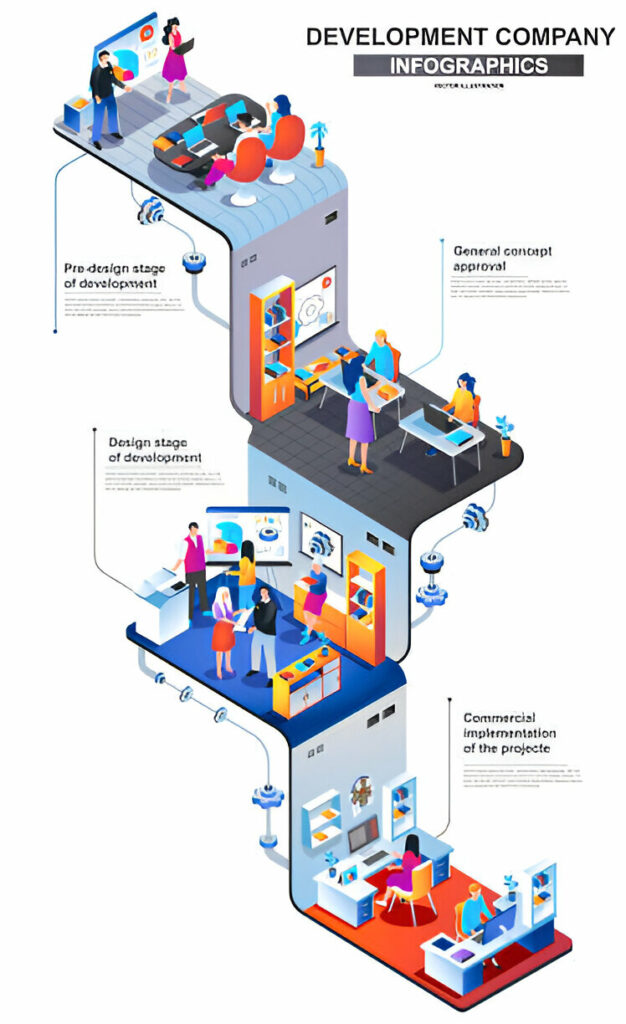Web Design & Developments
Empowering Businesses Through Strategic Website Development Solutions

Website Design
Website design is the art and science of creating visually appealing and user-friendly digital interfaces. It involves a combination of graphic design, user experience (UX) principles, and coding skills to craft websites that engage and captivate visitors. A well-designed website goes beyond aesthetics, seamlessly guiding users through an intuitive journey while reflecting the brand’s identity. Key considerations include responsive design for various devices, strategic placement of content, and optimization for search engines. Website designers meticulously balance form and function, ensuring not only an attractive appearance but also a seamless and enjoyable user experience. In essence, website design is the holistic process of translating ideas into a digital space, enhancing online presence, and facilitating meaningful interactions between businesses and their audiences. Let’s explore the essence of exceptional website design and how it can be the catalyst for your online success.
We help you find your targeted page at the top whenever an audience searches for your business-related topics.

Website Development
Website development is the art and science of creating a digital presence that seamlessly merges form and function. In the expansive realm of the internet, it serves as the foundation for establishing an online identity, whether for personal expression, business endeavors, or organizational outreach. At its core, website development encompasses the design, coding, and optimization processes that breathe life into a virtual space.
This dynamic field continually evolves, keeping pace with technological advancements and user expectations. Skilled developers leverage programming languages, frameworks, and design principles to construct websites that are not only visually appealing but also intuitive and responsive. From static informational pages to interactive web applications, website development plays a pivotal role in shaping the digital landscape. It is the conduit through which ideas, services, and information traverse the vast online ecosystem, connecting individuals and businesses with the global audience in an ever-expanding digital frontier. We must take care of these steps when it comes to website development

Select Web Design That Is Responsive to All Devices
In the ever-expanding digital landscape, the first crucial step in website development is adopting responsive web design. With users accessing websites on a multitude of devices, it is imperative to create a seamless and consistent experience across varying screen sizes. Responsive design ensures that your website adapts gracefully, delivering optimal functionality and aesthetics on desktops, tablets, and smartphones alike. This approach not only enhances user satisfaction but also positively impacts search engine rankings, reflecting the modern necessity for a versatile online presence.
Information Architecture
Effective website development extends beyond aesthetics, delving into the realm of information architecture. By investing time in crafting a well-organized structure, you guide users through your content logically. A clear hierarchy enhances user navigation, making it easier for visitors to find relevant information. Thoughtful information architecture not only contributes to a positive user experience but also facilitates content discoverability, making it a foundational element in the creation of an engaging and user-centric website.

Improve Website Speed and Performance
User attention is fleeting, making website speed and performance critical factors in successful development. Optimization measures such as image compression, code minimization, and content delivery network utilization significantly impact loading times. A faster website not only enhances user experience but also positively influences search engine rankings. Prioritizing speed and performance ensures that your website not only attracts and retains visitors but also meets the expectations of the modern online audience.
Make sure Accessibility
Inclusive design is a cornerstone of ethical website development. Ensuring accessibility means creating a digital space that accommodates users of all abilities. By incorporating features such as alternative text for images, keyboard navigation, and proper heading structures, you make your website accessible to a diverse audience. Prioritizing accessibility not only adheres to ethical design principles but also broadens your reach, making your content available to everyone, regardless of their physical abilities.
Make a search engine optimization plan
In the competitive digital landscape, effective Search Engine Optimization (SEO) is paramount for a website’s visibility. Begin by conducting thorough keyword research to understand your target audience’s search behavior. Optimize meta tags, headers, and content with relevant keywords to improve search engine rankings. A well-optimized website increases its chances of appearing on the first page of search results, driving organic traffic, and establishing your online presence as authoritative and relevant.
Formulate a Content Strategy
Compelling content is the backbone of any successful website. A well-thought-out content strategy involves regularly updating your site with fresh, relevant content that aligns with your brand and resonates with your target audience. Whether through blog posts, articles, or multimedia, quality content not only attracts visitors but also keeps them engaged. A cohesive content strategy serves as a roadmap for consistent communication, fostering a connection between your brand and your audience while establishing your authority in the industry.
Put Website Security First
In an era of increasing cyber threats, website security is non-negotiable. Prioritize the protection of your website and user data by implementing robust security protocols. This includes securing connections with HTTPS, regularly updating software and plugins, and employing measures against common security threats. A secure website not only builds trust with users but also safeguards against potential breaches, ensuring the confidentiality and integrity of sensitive information.
Create a Social Media Integration Plan
Social media has become an integral part of the online experience, and integrating it into your website is essential for holistic development. Embed social sharing buttons, display live feeds, and encourage user interaction across platforms. Social media integration not only expands your online presence but also fosters user engagement and community building. It serves as a valuable tool for communication, promotion, and brand visibility in the interconnected landscape of digital media.
Why Is Website Development so Important?
Website development is integral to establishing a strong online presence and fostering success in the digital age. A well-designed and functional website serves as the digital storefront of a business, acting as a central hub for brand representation, communication, and customer engagement. In today’s interconnected world, consumers often turn to the internet for product research and services, making a website a fundamental tool for attracting and retaining customers.
An effectively developed website not only enhances brand credibility but also facilitates seamless navigation and user experience. It becomes a powerful marketing tool, providing a platform for businesses to showcase their products, share valuable content, and establish a distinctive brand identity. Furthermore, a responsive and mobile-friendly website is essential for reaching a broader audience, as an increasing number of users access the internet via smartphones and tablets.
For e-commerce ventures, website development is particularly crucial, enabling secure transactions and creating a user-friendly shopping experience. Overall, website development is synonymous with digital success, contributing to increased visibility, customer trust, and business growth in an increasingly competitive online landscape.
